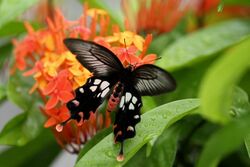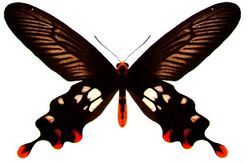Biology:Losaria rhodifer
From HandWiki
Short description: Species of butterfly
| Andaman clubtail | |
|---|---|

| |
| Scientific classification | |
| Domain: | Eukaryota |
| Kingdom: | Animalia |
| Phylum: | Arthropoda |
| Class: | Insecta |
| Order: | Lepidoptera |
| Family: | Papilionidae |
| Genus: | Losaria |
| Species: | L. rhodifer
|
| Binomial name | |
| Losaria rhodifer (Butler, 1876)[1]
| |
| Synonyms | |
|
Atrophaneura rhodifer | |
Losaria rhodifer, the Andaman clubtail, is a rare species of the swallowtail family, Papilionidae, native to India . The butterfly belongs to the genus Losaria, or the clubtails, as they are commonly known.[1]
Distribution[2]
The butterfly is endemic and restricted to the Andaman Islands in the Bay of Bengal.
Description
Male differs from Losaria coon as follows:[3]
Ground-colour a rich velvety-black, much darker than in doubledayi; on the fore wing the pale streaks extend only into the apex of the cell. On the hind wing the medial white markings are much shorter, the spots at base of interspaces 4 and 5 and generally the spot in interspace 7 absent; the subterminal and terminal vermilion spots are much larger, and the tail is vermilion on its apical spatulate portion. Antennae, head, thorax and abdomen as in doubledayi, but the head entirely vermilion-red. Female closely resembles the male, fore wing broader, red markings on hind wing more crimson than vermilion-red, often dull and irrorated slightly with black scales; medial white markings more extensive, the white mark in interspace 1 extends well below vein 1.
Status
It has been described as not rare but much work needs to be done to clarify its exact status and distribution. It is not listed as threatened.[4]
Taxonomy
There are no subspecies.
See also
- Papilionidae
- List of butterflies of India
- List of butterflies of India (Papilionidae)
Cited references
- ↑ 1.0 1.1 "Papilionidae – revised GloBIS/GART species checklist (2nd draft)". Entomological Data Information System. Staatliches Museum für Naturkunde Stuttgart, Germany. 28 July 2005. http://www.insects-online.de/frames/papilio.htm. Retrieved 21 June 2013.
- ↑ Rushbrooke (ZSL), Martha; Moonen, Jan; Kunte, Krushnamegh; Kehimkar, Isaac; Jangid, Ashish (2019-01-11). "IUCN Red List of Threatened Species: Losaria rhodifer". doi:10.2305/iucn.uk.2020-2.rlts.t121974900a170538804.en. https://www.iucnredlist.org/en.
- ↑ Bingham, C.T. (1907). The Fauna of British India, Including Ceylon and Burma. II (1st ed.). London: Taylor and Francis, Ltd.. https://archive.org/details/butterflies02bingiala.
- ↑ Collins, N. Mark; Morris, Michael G. (1985). Threatened Swallowtail Butterflies of the World: The IUCN Red Data Book. Gland & Cambridge: IUCN. ISBN 978-2-88032-603-6. https://www.biodiversitylibrary.org/item/98674#page/7/mode/1up.
References
- Evans, W.H. (1932). The Identification of Indian Butterflies (2nd ed.). Mumbai, India: Bombay Natural History Society.
- Haribal, Meena (1992). The Butterflies of Sikkim Himalaya and Their Natural History. Gangtok, Sikkim, India: Sikkim Nature Conservation Foundation.
- Wynter-Blyth, Mark Alexander (1957). Butterflies of the Indian Region. Bombay, India: Bombay Natural History Society. ISBN 978-8170192329. https://books.google.com/books?id=yEkgAQAAMAAJ.
- K. Veenakumari & Prashanth Mohanraj, 1994 "Life history of Pachliopta rhodifer (Papilionidae: Troidini)" Journal of the Lepidopterists' Society 1994 Volume 48:111-120 pdf
Wikidata ☰ Q1759610 entry
 |



